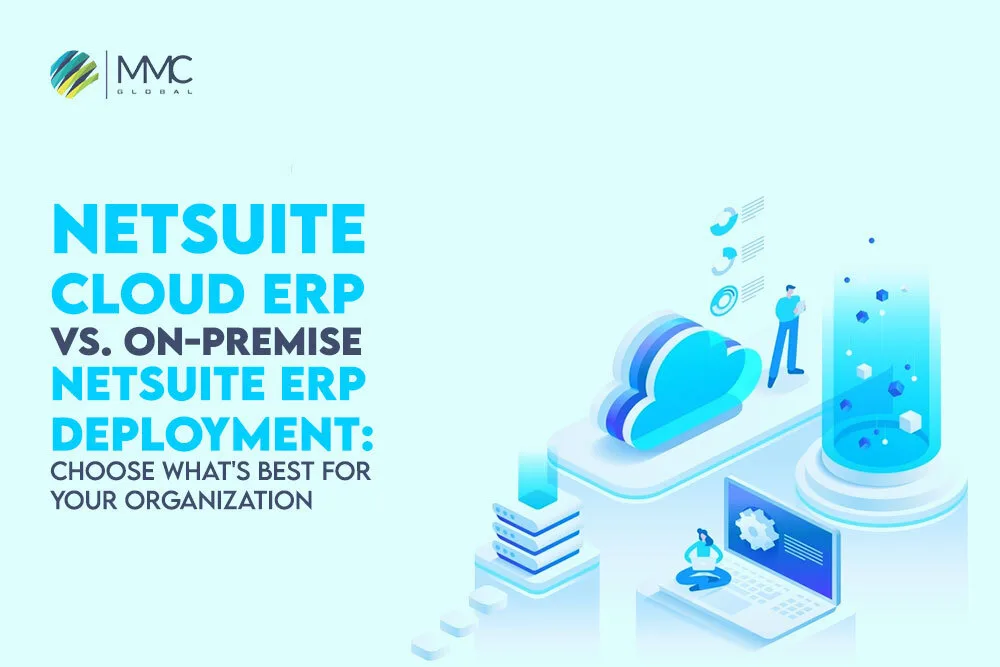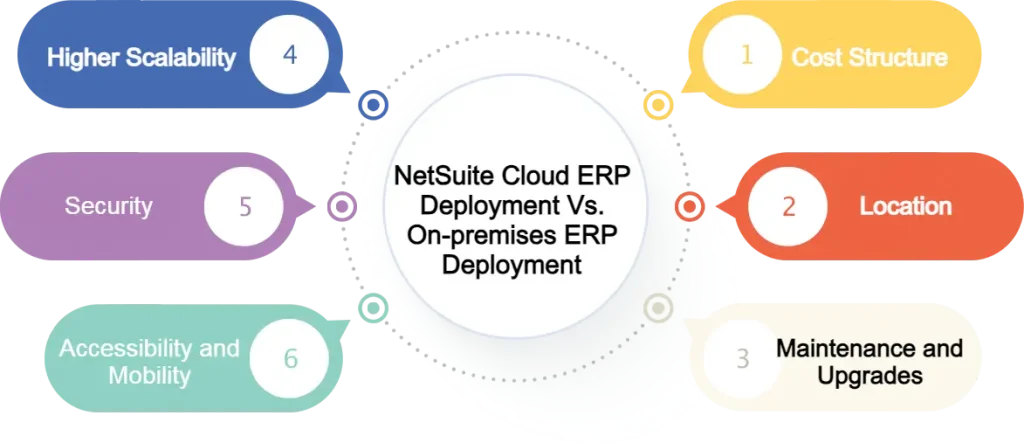NetSuite Cloud ERP vs. On-Premise NetSuite ERP Deployment: Choose What’s Best for Your Organization


An ERP solution is the best source to associate core business functions with one platform. All departments are seamlessly connected to create effective communication, easy data accessibility, on-time decision-making, and gather sales opportunities. With the help of NetSuite cloud ERP integration, you can get more than that. Giant business tycoons highly recommend NetSuite integration for ERP as they showed greater success by implementing NetSuite ERP.
However, the preference is either the cloud-based ERP that NetSuite gives you or on-premises ERP development. As cloud computing is the latest technology that provides huge data storage with high-end security, cloud ERPs are also emerging at a rapid pace and meeting organizational goals.
Difference Between Cloud ERP Vs. On-Premises ERP Deployment
Cloud ERP and on-premise ERP differ in terms of deployment. On-premises ERP involves hosting the system on the company’s servers and infrastructure, while cloud ERP is on the vendor’s servers and retrieved via the Internet. Furthermore, on-premises ERP requires upfront investments in hardware and software licenses, along with maintenance and upgrades handled by the company.
In contrast, cloud ERP follows a subscription-based model with lower initial costs and the provider managing maintenance and updates. On-premises ERP offers more control and customization options but requires internal resources, whereas cloud ERP provides scalability, accessibility, and cost advantages.
However, having a great NetSuite development team helps you get cost-effective and highly scalable solutions for your business. The emerging cloud computing technology enables firms to deploy safe and secure ERP solutions. According to data, 70% of companies choose NetSuite cloud ERP integration for their business.
Let’s identify the factors that evaluate what works best for your business.
NetSuite Cloud ERP Deployment Vs. On-premises ERP Deployment

Cost Structure
On-premises ERP typically requires a significant upfront investment in hardware, infrastructure, and software licenses. The company bears the costs of purchasing and maintaining the hardware and hiring IT staff to manage the system. In comparison, NetSuite Cloud ERP follows a subscription-based model, where companies pay a recurring fee based on usage. It also lowers initial costs and allows for more predictable ongoing expenses.
Location
On-premises ERP is installed and hosted on the company’s servers and infrastructure. The software and data are physically located within the company’s premises. On the other hand, NetSuite cloud ERP is hosted on the vendor’s servers and accessed through the Internet. The software and data are stored in remote data centers.
Maintenance and Upgrades
With on-premises ERP, the company is responsible for maintaining the hardware, infrastructure, and software. It also includes installing updates, applying patches, and managing backups. In contrast, NetSuite cloud ERP providers handle all the maintenance and upgrades. NetSuite implementation ensures the system is up-to-date and addresses issues or bugs in real-time.
Higher Scalability
On-premises ERP systems may require additional hardware and infrastructure investments to accommodate growth or handle increased workloads. Scaling up can be time-consuming and costly. NetSuite integration of Cloud-based ERP offers greater scalability as it has a wide range of features and functionalities and manages infrastructure by in-house professionals. In fact, companies can easily scale up or down based on their needs without hardware investments.
Accessibility and Mobility
On-premises ERP systems are accessible only from within the company’s network or through VPN connections. NetSuite cloud ERP allows users to access the system from anywhere with an internet connection. It will enable internal and external teams to get remote and mobile access and facilitates collaboration among geographically dispersed teams.
Security
On-premises ERP gives the company direct control over the security measures implemented. It allows companies to tailor security protocols to their specific requirements. However, it also means the company is responsible for maintaining and updating security measures. On the other hand, NetSuite integration of Cloud ERP providers invests heavily in security measures and data protection. They typically employ advanced encryption, redundancy, and disaster recovery mechanisms to ensure data safety.
Get More Info: NetSuite Development and ERP Implementation – Boosting Your Business Efficiency
Wrapping Up
Choosing between NetSuite cloud ERP and on-premise ERP depends on various factors such as budget, IT resources, scalability needs, data security requirements, and the company’s long-term strategy. Cloud ERP offers flexibility, accessibility, and cost advantages, while on-premises ERP provides more control and customization options but requires higher upfront investments and ongoing maintenance.
NetSuite cloud ERP integration is one of the cost-effective and scalable solutions for your business. NetSuite development team to deploy effectively in our organization. At MMC Global, you can get all in one. From custom designing and development of NetSuite cloud ERP to Deployment and post support and maintenance, we will help you all the way.



